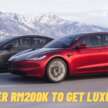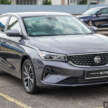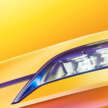First announced as luxury tax, Malaysians will soon face the newly-named High Value Goods Tax (HVGT) starting from May 1, 2024 according to prime minister Datuk Seri Anwar Ibrahim. The new tax, set to be imposed on luxury or big-ticket items, will have a rate of between 5% and 10% as announced at the tabling of Budget 2024.
However, beyond high-value jewellery and watches as mentioned by Anwar before, it appears the HVGT will also apply to private jets, yachts and luxury cars as reported by The Star. A guideline provided by the Finance Ministry for the industries to give their feedback on even provides thresholds for items to be taxed.
For now, it looks like jewellery over RM10,000, watches above RM20,000 and cars priced beyond RM200,000 will be subject to the new high-value tax of between 5% to 10%. It is not yet known if the so-called luxury cars will get an additional tax of 5%, 10% or anything in between.
Taking the base RM200k price, an extra 5% tax (assuming it’s imposed on the full amount) will mean the car will be RM10k more expensive to the buyer. If the HVGT is set to 10%, that’s RM20k. Likewise, a RM500k car will be costlier by RM25k at a 5% rate, or a full RM50k more at 10%. Though it’s all a straightforward percentage game, it sure sounds like it will affect the RM200k car buyer more, right?
Taking the base RM200k price, an extra 5% tax (assuming it’s imposed on the full amount) will mean the car will be RM10k more expensive to the buyer. If the HVGT is set to 10%, that’s RM20k. Likewise, a RM500k car will be costlier by RM25k at a 5% rate, or a full RM50k more at 10%. Though it’s all a straightforward percentage game, it sure sounds like it will affect the RM200k car buyer more, right?
The base MINI Electric would escape the HVGT, but the Kia Carnival will be taxed more?
It will also have more pronounced effects on car models that have variants straddling the tax threshold. Taking the Tesla Model 3 for instance, while the base RM189k SR would not be affected by the HVGT, the RM218k LR would have to be repriced to either RM229k (5%) or RM240k (10%) from May next year. And if you tick a few option boxes even on the base model, that will tip it over the crucial threshold.
As it is, a few popular models already have long waiting lists that could stretch past the May 1 deadline, so this price hike may already apply to customers making a new booking now. Even for models without such long waiting times, will this impending tax cause another wave of rushed bookings like the SST tax holidays in the past few years?
It’s unlikely that the government will extend or absorb the tax difference past the implementation date like it did with the previous SST holidays, seeing that the HVGT is meant to “tax those who had the means.”
Also, would this even apply to EVs, which are virtually sold tax-free here in Malaysia (apart from 10% sales tax for CBU models)? What about grey import cars that have far more fluid pricing? Will discounting be more prevalent to bring prices below the threshold? Should be expect more cars to be priced at RM199,999 soon? Used cars? There are certainly plenty of question yet to be answered.
Should these entry-level premium cars get taxed at the same rate as far more expensive models?
“At this juncture, the Finance Ministry is finalising the policy and legal aspects of taxing high value goods. Any changes to tax policy will have to take into account the impacts on the economy and cost of living of the people,” said the PM in a written parliamentary reply dated Nov 1.
What do you think of this, folks? Is it fair for the government to tax cars specifically above RM200k, and is that even the right threshold to begin with? Discuss below.
In any case, if you’re looking to buy a premium car anytime soon, PACE 2023 this weekend at the Setia City Convention Centre is the place to be for the best year-end offers and perhaps, your last chance to avoid paying the new High Value Goods Tax.
The post High Value Goods Tax to start in May 2024: cars above RM200k to get another 5% to 10% tax in Malaysia? appeared first on Paul Tan’s Automotive News.




